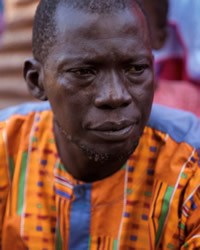Bainouk, Gunyaamolo in Senegal

Photo Source:
Erik Laursen, New Covenant Missions
|
Send Joshua Project a map of this people group.
|
| People Name: | Bainouk, Gunyaamolo |
| Country: | Senegal |
| 10/40 Window: | Yes |
| Population: | 40,000 |
| World Population: | 75,000 |
| Primary Language: | Bainouk-Gunyaamolo |
| Primary Religion: | Ethnic Religions |
| Christian Adherents: | 16.00 % |
| Evangelicals: | 0.29 % |
| Scripture: | Portions |
| Ministry Resources: | Yes |
| Jesus Film: | No |
| Audio Recordings: | Yes |
| People Cluster: | Atlantic |
| Affinity Bloc: | Sub-Saharan Peoples |
| Progress Level: |
|
Introduction / History
The Bainouk are a West African Forest people present in Guinea-Bissau, Casamance (southern Senegal) Gambia and Senegal. They also go by Gunyaamolo, so we will call them the Gunyaamolo Bainouk. According to scientists, the Baïnunks are the oldest population in Senegal.
In the time of the Mali Empire, the Bainuk lived much further north, in the Sine and Saloum for example. According to their oral tradition, they originated in the east, and were brought to occupy the southwestern regions of the Gambia and western Casamance, following the massive influx of Malinke conquerors. They arrived in the regions they populate today, under the bainunk king Gana Sira Bana. According to a Bainouk legend, Gana Sira Bana put a curse on his Bainouk people, following his assassination by his subjects. He promised the Bainunks a dark future and their disappearance over the centuries.
They were also pushed further south by the Serer migrations. The Bainouks created numerous powerful chiefdoms, which constituted the Bainouk Kingdom. The kingdom with its fertile lands lived from a flourishing agriculture. Later, the Bainunks came under the domination of the Malinke.
The Malinke mingled with Bainunk families who dominated the region before their arrival, but also with the Diolas. This interbreeding gave rise to the Nanko nobility (Ñaanco), the reigning dynasty of Kaabu, initially with the surnames Traoré and Keita. The Bainunks were also integrated into Malinke society. The Mandingos who ruled southern Senegal protected the forest ethnic groups. The Bainunk Kingdom, vassal of the Kaabu, fell definitively in the 1830s, when their capital Birikama was destroyed by fire, orchestrated by the Balantes. The kingdom was also subject to the exactions of the Diolas and the Mandingos. The Bainunks traditionally cohabit with the Diolas, Mancagnes, Balantes, Coniaguis, Peuls and Mandingues.
Reputed to be a peaceful and tolerant people, the Bainunks preceded and welcomed all other ethnic groups in Casamance. Their presence in this region dates back to the 6th century AD.
What Are Their Lives Like?
Ironically the Bainunks now avoid merging with other ethnic groups. When others settle alongside them, they move on. A tenacious prejudice says that the one who marries a Bainunk will not succeed in life. Does this explain the lack of intermarriage with other ethnic groups?
The Bainunks have cousinship links with the Peuls, the Lebous and the Sereres. As for the Fulani, the Baïnunks are grateful to them for having saved them from extermination. According to legend, the Bainuk king, Ganasiraba Biaye, on the advice of his fetishist, had to kill, by way of sacrifice, one hundred men and as many women among his subjects. A Fulani would have given them a subterfuge (to trap him to make him fall into a well) to eliminate the bloodthirsty king and thus escape extermination. From there, the pact started.
Traditionally, Bainunk society is hierarchical in terms of age groups, the power of the elders and initiation rites. Bainunk society is matrilineal. It was the sons of maternal aunts who inherited royal power. As in almost all African societies, women have a lot of power. The Bainunk are as often Muslim as they are Christian. Certain rites of their original religion still exist.
What Are Their Beliefs?
The Kumpo is a traditional mythological figure of the Bainunk Manding people of Casamance and Gambia whose exact origin is difficult to say. It is both a mask and a moonlight dance to call upon this spirit which then comes out of the forest where it dwells.
The exact etymology of the name cannot be given with certainty: it would be a deformation of the Wolof word Kumpa which means that which is secret because it arouses curiosity; or else that which is reserved for initiates and therefore cannot be deciphered by a layman.
What Are Their Needs?
The Gunyaamolo Bainouk people have many serious spiritual needs, but they also need safe drinking water and adequate medical care.
Prayer Points
Pray for the total completion of the work of the health hut in the village which is a means to evangelize the Bainunks through health.
Pray that the Lord Jesus Christ will free the Bainouk from false beliefs.
Pray that the church of Jesus Christ will be planted in every Bainunker village.
Pray that God will continue to use church planters.
Pray for the salvation of Chief Firmin DIATTA of Guérina village.